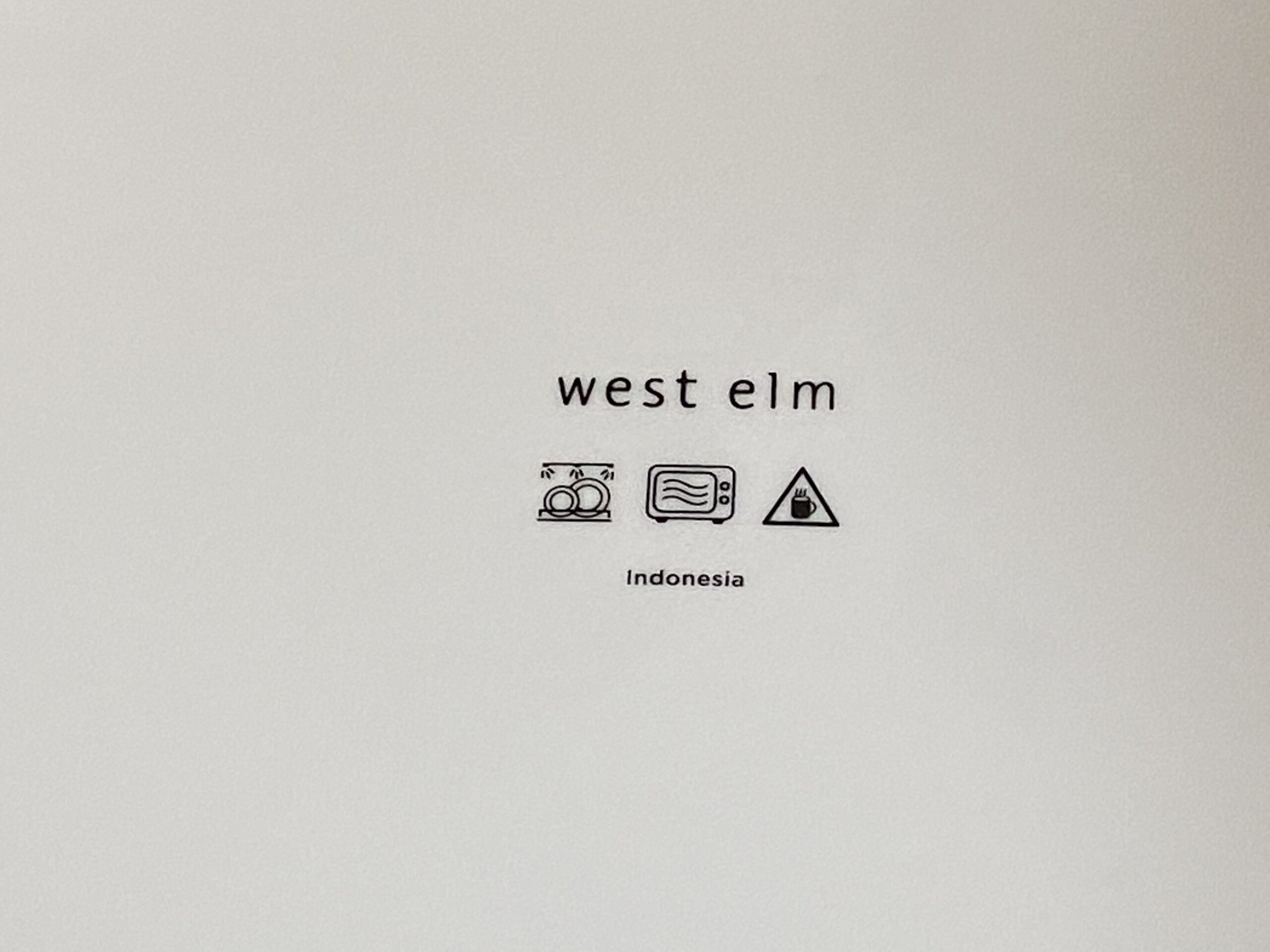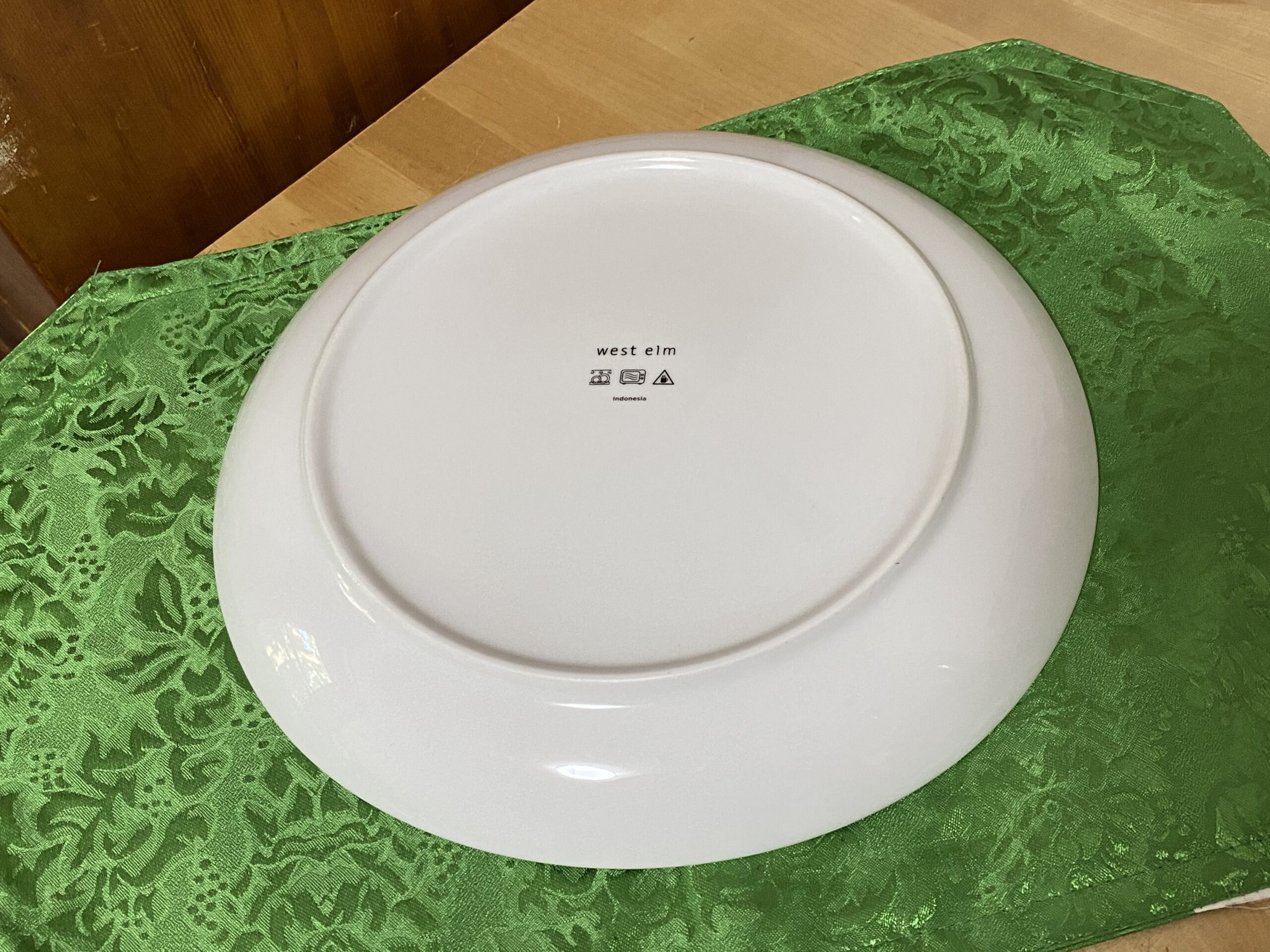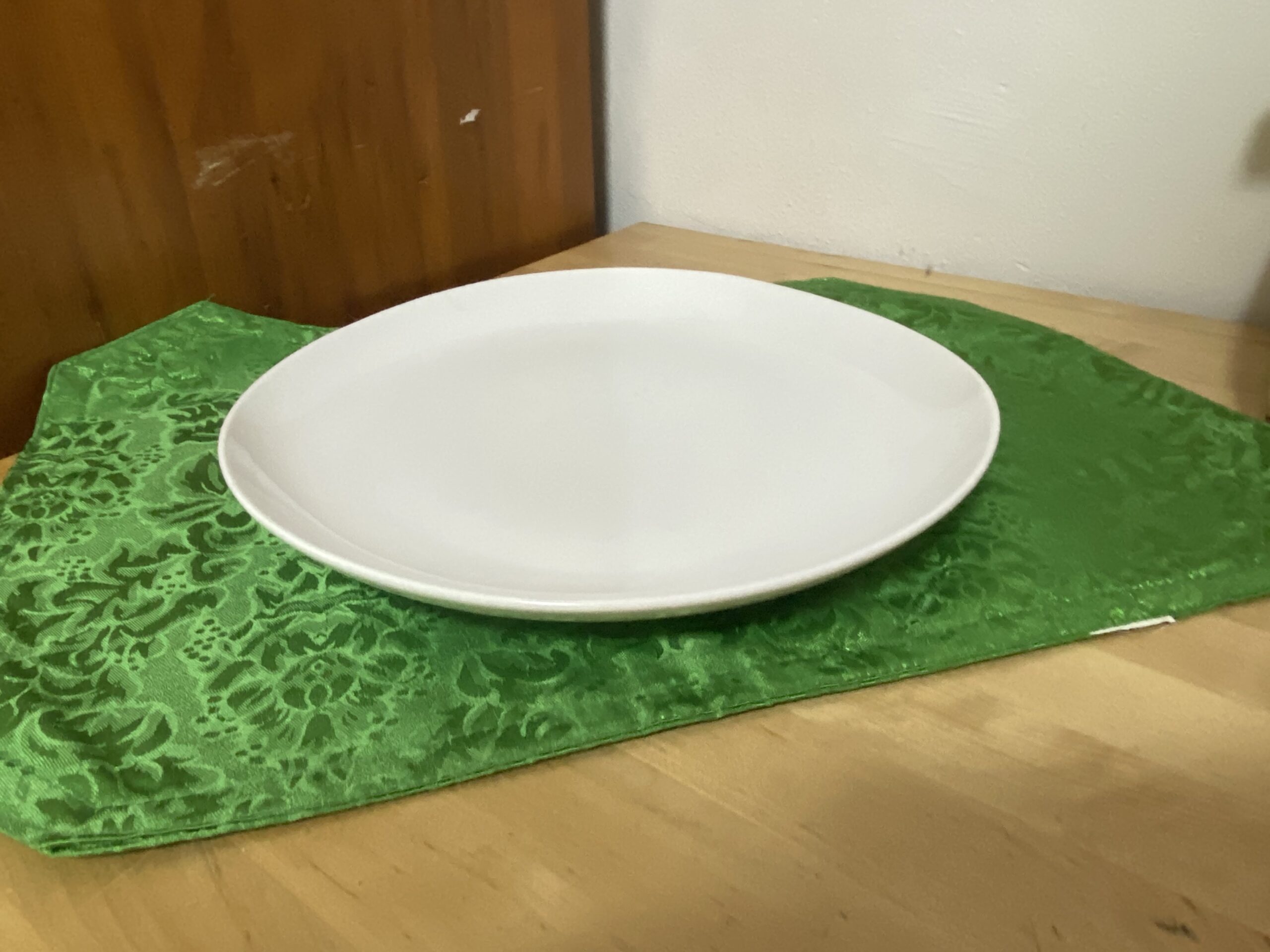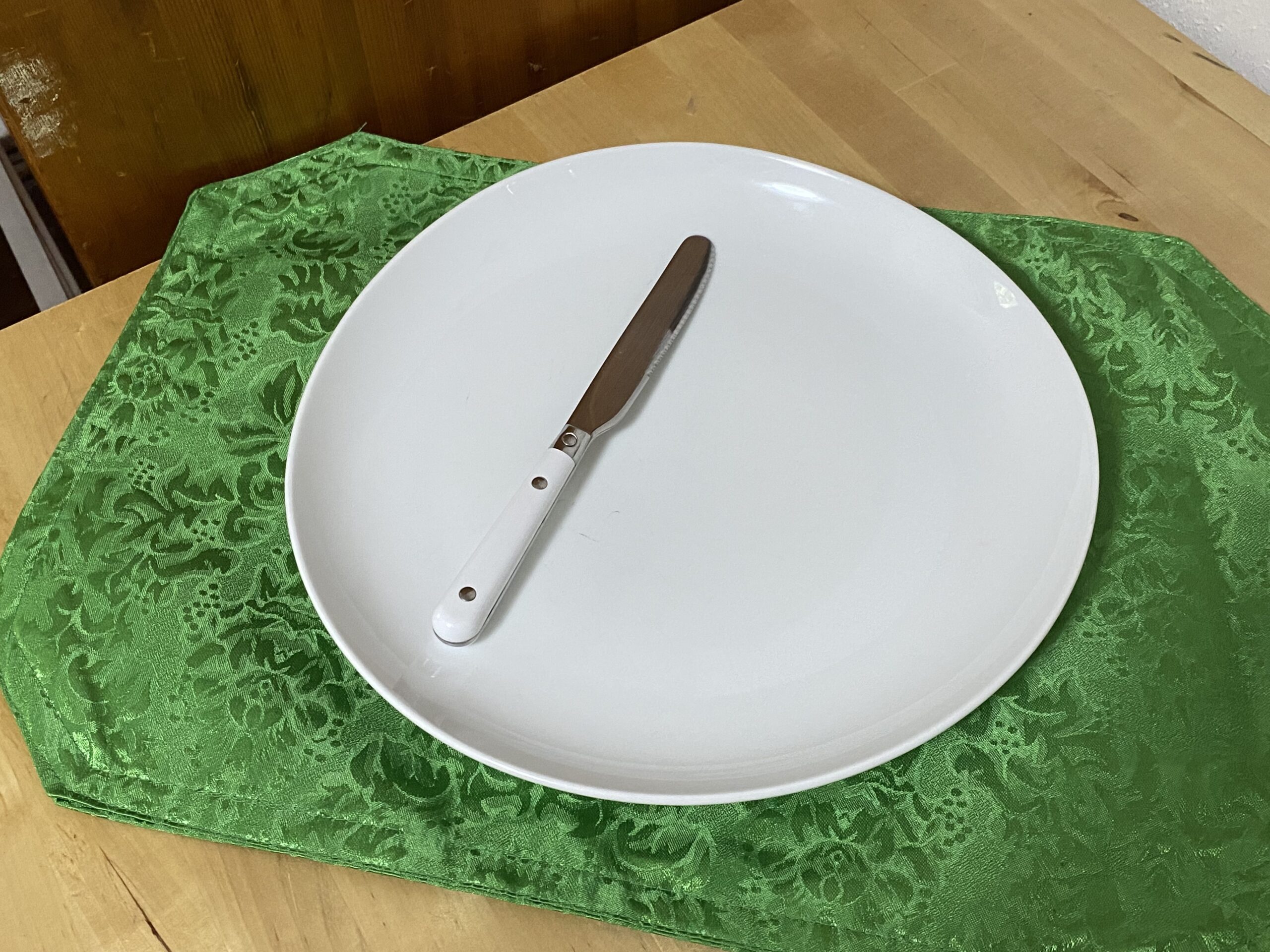West Elm White Ceramic Large Dinner Plate (Indonesia): Lead-safe food surface & high-Lead back mark/logo area.
Introduction:
Tamara Rubin is an independent advocate for consumer goods safety, and she is also a mother of Lead-poisoned children. She began testing consumer goods for toxicants in 2009, and was the parent-advocate responsible for finding Lead in the popular fidget spinner toys in 2017. She uses XRF testing (a scientific method used by the Consumer Product Safety Commission) to test consumer goods for metallic toxicants (including Lead, Cadmium, Mercury and Arsenic). To read more about the testing methodology employed for the test results reported on this blog, please click this link.
Full XRF test results for the West Elm dish pictured
(made in Indonesia)
120-second reading, Food Surface of Dish – reading #1
- Lead (Pb): 5 +/- 2 ppm
- Cadmium (Cd): 4 +/-1 ppm
- Mercury (Hg): non-detect
- Bromine (Br): non-detect
- Chromium (Cr): non-detect
- Iron (Fe): 454 +/- 30 ppm
- Zinc (Zn): 8 +/- 3 ppm
- Indium (In): 3 +/- 2 ppm
- Tin (Sn): 8 +/- 2 ppm
- Bismuth (Bi): 29 +/- 2 ppm
120-second reading, Food Surface of Dish – reading #2
- Lead (Pb): 4 +/- 2 ppm
- Cadmium (Cd): 3 +/-1 ppm
- Mercury (Hg): non-detect
- Bromine (Br): non-detect
- Chromium (Cr): non-detect
- Iron (Fe): 543 +/- 30 ppm
- Zinc (Zn): 7 +/- 3 ppm
- Tin (Sn): 6 +/- 2 ppm
- Bismuth (Bi): 20 +/- 2 ppm
30-second reading, Back Mark / Logo of Dish – reading #1
over hot cup symbol
- Lead (Pb): 3,441 +/- 51 ppm
- Cadmium (Cd): 41 +/-3 ppm
- Mercury (Hg): non-detect
- Bromine (Br): non-detect
- Chromium (Cr): 1,076 +/- 156
- Manganese (Mn): 1,996 +/- 125 ppm
- Cobalt (Co): 1,754 +/- 66 ppm
- Zinc (Zn): 808 +/- 26 ppm
- Tin (Sn): 7 +/- 4 ppm
- Platinum (Pt): 103 +/- 24 ppm
60-second reading, Back Mark / Logo of Dish – reading #2
over microwave symbol
- Lead (Pb): 3,281 +/- 36 ppm
- Cadmium (Cd): 38 +/- 2 ppm
- Mercury (Hg): non-detect
- Bromine (Br): non-detect
- Chromium (Cr): 973 +/- 112
- Manganese (Mn): 1,854 +/- 89 ppm
- Iron (Fe): 1,990 +/- 64 ppm
- Cobalt (Co): 1,535 +/- 45 ppm
- Zinc (Zn): 806 +/- 19 ppm
- Tin (Sn): 7 +/- 3 ppm
- Platinum (Pt): 82 +/- 17 ppm
Some additional reading that might be of interest:
- The post discussing the testing methodology used on this website
- Post discussing how to send in an item for testing
- Things that you can test at home.
- Things that might be better tested with an XRF instrument.
Thanks for reading. Thank you for sharing my posts. As always, please let me know if you have any questions and I will do my best to answer them personally as soon as I have a moment (which may not be right away – but I will try!)
Tamara Rubin
#LeadSafeMama
Amazon links are affiliate links. If you purchase something after clicking on one of my links I may receive a percentage of what you spend – at no extra cost to you.
Never Miss an Important Article Again!
Join our Email List







Hi Tamara,
So nearly a good plate, then they put lead paint in the print. I guess there is not a lot of lead there. 3341 ppm would be 3.3 mcg if there was 1mg of paint. However, I wonder, if the sample is small, could the XRF scanner be also reading the substrate, which is glaze or ceramic, and so diluting the result such that the actual paint could have a lot higher concentration of lead?
Do you test this only sent by your viewers or you yourself pick randomly? I request you to test some indian stuff as well…if possible. Do you charge fee for that as well?
Hi! Thank you for commenting. I test things sent in by my readers and there is a fee for participating to help cover the costs. Here’s the post that discusses this:
https://tamararubin.com/2019/08/tamara-can-i-send-you-one-of-my-dishes-to-test-for-lead/
Here’s the “Made in India” category on the blog as well:
https://tamararubin.com/category/made-in-india/
T
Hi Tamara, I have these dishes and am trying to decipher whether or not they are safe. Does it matter that there is lead on the back if we aren’t eating off that surface? Thanks for all you do!!! This info is so helpful!
Hi Shannan –
Please read this for context:
https://tamararubin.com/2020/07/if-the-lead-is-only-on-the-outside-of-my-dish-measuring-cup-mixing-bowl-etc-why-does-it-matter-that-it-has-lead/
Tamara